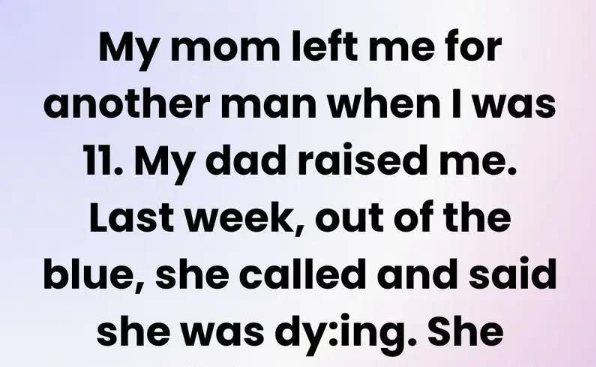Family ties are intricate, woven with threads of love, pain, and unspoken expectations. For many older adults, narratives of caregiving, reconciliation, and familial duty resonate profoundly, touching the essence of devotion, loyalty, and the connections that define us.
This account, shared by a young woman reflecting on her turbulent past, illustrates the emotional complexity of an estranged parent’s sudden return, particularly in life’s later chapters. It weaves together themes of caregiving, decisions about elder care, and the internal struggle between compassion and protecting one’s heart.
A Childhood Shaped by Absence
At the tender age of 11, her mother chose to leave. Not for a fresh start or a new venture, but for another relationship, abandoning her daughter to be raised solely by her father.
Her father became her anchor, nurturing her with steadfast commitment. As she grew into adulthood, she carried a lasting wound—the absence of her mother’s warmth. Unlike many who draw strength from both parents, she faced birthdays, school achievements, and the challenges of adolescence without her mother’s guidance.
Now, at 29, her father has passed, leaving her the family home. Through determination, she built a stable life on her own terms, believing her mother’s chapter was permanently closed.
A Call That Shook Her World
Last week, her reality shifted. A phone call brought her mother’s voice, faint but unmistakable, delivering news no child anticipates. Her mother was seriously ill and sought to reconnect. More than that, she wished to return to the family home.
Her mother’s plea wasn’t solely about finding comfort in illness. She spoke of wanting to “set things right,” yearning to spend her final days in the house that once held their shared memories.
For the daughter, those words landed heavily. Her response was raw and truthful: “You didn’t raise me. You chose to leave.”
Her mother wept, calling her unkind and emphasizing that she was her only child. Yet a single call couldn’t bridge years of absence.
An Unforeseen Arrival
The daughter thought the painful exchange was over. Her stance felt firm, with no intention of revisiting it. But the next day, an unexpected twist unraveled her resolve.
Police appeared at her door following a neighbor’s concern. They found a frail woman collapsed on the front steps, suitcases scattered around her. It was her mother.
She had waited for hours, weakened by illness and fatigue. Authorities suspected she might have collapsed from missing medications or the sheer toll of waiting in the cold.
Rushed to the hospital, her mother listed no emergency contact when asked if her daughter could be reached.
Wrestling with Guilt and Boundaries
In that moment, guilt surged. Not from a lack of empathy—she genuinely cared about her mother’s health—but from the emotional storm within. She had already mourned her mother’s absence for years, despite her being alive.
It was like grieving a shadow—a parent who chose distance over connection. While some might argue illness warrants forgiveness, she felt otherwise. Her boundaries weren’t born of spite; they were her shield.
Welcoming her mother into her home now, after decades of silence, would mean reopening wounds she had painstakingly healed.
Do Children Owe Care to Estranged Parents?
This story prompts a poignant question many seniors may ponder: What do we owe family members who left us behind?
Caregiving demands immense emotional and financial resources. For those with nurturing parental bonds, the choice to care often feels instinctive. But when abandonment or betrayal marks the past, the decision becomes clouded. It’s not only about caregiving; it’s about safeguarding one’s emotional well-being. Reconciliation is possible, but it cannot be rushed or erase years of hurt in an instant.
Balancing Compassion and Self-Protection
For many, caring for a struggling parent feels natural. We reflect on their sacrifices, their love, and the values they instilled. But when that foundation is absent—replaced by years of silence or rejection—compassion becomes harder to summon.
This is the heart of her struggle. Compassion murmurs, “She’s still your mother.” Self-protection counters, “But she abandoned you first.”
Both perspectives hold truth, and neither choice is without pain.
Insights for Families Navigating Tough Choices
This story resonates because it mirrors the intricate challenges many families face as they age. Discussions about caregiving, living arrangements, and elder support can turn into emotional battlegrounds when past hurts remain unresolved.
For seniors and their adult children, the takeaway is evident: address expectations, caregiving roles, and emotional needs before crisis strikes. Honest communication, though difficult, can prevent deeper pain later.
Finding Peace Amid Imperfection
Ultimately, this young woman’s choice wasn’t about withholding kindness but about preserving her strength. Opening her home would have reopened years of grief. While some may question her decision, only she understands the depth of her pain.
Reconciliation isn’t a path everyone can take. Sometimes, peace comes from maintaining distance, even as guilt lingers. Other times, families find healing late in life. Both journeys require immense courage.
For seniors, this story may echo personal experiences. Perhaps you’ve faced similar dilemmas—whether to forgive or to protect your heart. What matters is honoring your truth and recognizing that love, even when complex, shapes every choice.
A Closing Thought
When her mother asked to return, she said no. When her mother appeared at her doorstep, she still couldn’t say yes. Guilt tugged at her, but she reminded herself she had mourned her mother long ago.
Does this make her cold? Far from it. It makes her human—a daughter who learned to thrive despite a mother’s absence and chose to protect the life she built.
This story serves as a profound reminder for families: love is complex, reconciliation isn’t assured, and the choices made in life’s hardest moments reflect not cruelty, but courage.




